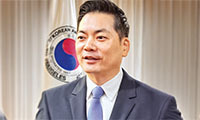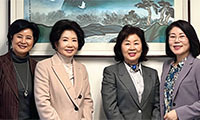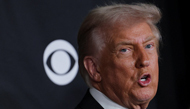▶ NEWS ANALYSIS

Presidents Obama and John Atta-Mills of Ghana were cast as superheroes in the preparations for Mr.Obama’s recent visit.
By JEFFREY GETTLEMANWhen President Obama delivered his Inaugural Address, there was a line in it that many Africans felt was written specifically for them - a kind of shout out across the Atlantic that the new, young president had not forgotten the fatherland.
“To those who cling to power through corruption and deceit and the silencing of dissent,” the new president said, “know that you are on the wrong side of history.”
This, of course, could apply to a large chunk of the world. But in Africa, where Big Men still rule for decades, and corruption leaves the children sick and the schools bare, and government soldiers rape and kill with impunity, those words seemed to have extra resonance. Olara A.Otunnu, a former Ugandan foreign minister, remembered how that single line from the inaugural speech was “cheered throughout Africa and people were texting it to each other over their phones.’’
“People were saying, ‘Our son is there, in the White House, God bless us.’”
On July 11, when President Obama stepped off Air Force One in Ghana for his first presidential visit to sub-Saharan Africa, it was clear he was stepping onto a continent of stratospheric expectations. He was mobbed at the airport by drummers and dancers and seemingly the entire Ghanaian government, as if his arrival were a long-awaited homecoming.
There is no denying that Mr.Obama, by the sheer dint of his Kenyan heritage, coupled with his progressive politics, his youth and his seemingly intuitive grasp of how people across the world interconnect, has an unprecedented opportunity to rewrite the America-Africa equation. Still, how to get involved? And when?
P.L.O.Lumumba, a leading anticorruption activist in Kenya, said that the masses were ready to line up behind Mr.Obama and that he should use his incredible position to pressure corrupt governments to reform themselves.
“The Obama administration should be tough as tough can be,’’ said Mr.Lumumba, who is named after one of the leading lights of Africa’s independence era, Patrice Lumumba, a Congolese hero who was assassinated in 1961 with the help of the C.I.A.
Africans have always had divergent views on America, Mr.Otunnu said. On the one hand, Africans idolized the United States as the land of opportunity and unimaginable wealth, the place they could hope one day to see with their own eyes, or better, to live in. On the other hand, the United States also evoked the dictators it had supported, and what were seen as harsh, neocolonial policies.
But with Mr.Obama in office, Mr.Otunnu said, “that changed suddenly overnight. The U.S. now has a very different meaning to Africans.”
Some of this, of course, is that Barack Obama is seen as kin. But there’s also the fact that he was an underdog in a fierce campaign and a black man elected in a white country, validation that America was indeed the land of opportunity. More than anything, his triumph served as a sharp contrast to a continent where name, class and ethnicity are still destiny, and, just in case destiny is ever interrupted, where many elections are still blatantly rigged.
“He’s not your typical Anglo-Saxon,” Mr.Lumumba said. Until this trip to Ghana, President Obama had stayed away from Africa. But Mr.Otunnu said that Africa can wait. It’s how the traditional African chief works.
“He meets, he consults and then he decides,” Mr.Otunnu said. “The chief doesn’t rush.”
스마터리빙
more [ 건강]
[ 건강]이제 혈관 건강도 챙기자!
[현대해운]우리 눈에 보이지 않기 때문에 혈관 건강을 챙기는 것은 결코 쉽지 않은데요. 여러분은 혈관 건강을 유지하기 위해 어떤 노력을 하시나요?
 [ 건강]
[ 건강]내 몸이 건강해지는 과일궁합
 [ 라이프]
[ 라이프]벌레야 물럿거라! 천연 해충제 만들기
 [ 건강]
[ 건강]혈압 낮추는데 좋은 식품
[현대해운]혈관 건강은 주로 노화가 진행되면서 지켜야 할 문제라고 인식되어 왔습니다. 최근 생활 패턴과 식생활의 변화로 혈관의 노화 진행이 빨라지고
사람·사람들
more많이 본 기사
- ‘안면 인식’으로 불체자 확인·체포한다
- “생닭 뜯는 故 안성기, 경악스러워”..배현진, 조문 태도 논란
- 75세 박원숙, 분장실서 쓰러졌다 “쉬어야 한다는 자각 못해”
- 아동 예방접종 권장 백신 17→11종 축소
- 故 안성기 장남인 미술가 안다빈, 아버지를 보내며..
- 폭우 후 기온 내려가 주말까지 맑고 쌀쌀
- 마두로 법정 첫 출두… “나는 무죄” 주장
- “새해 역동적인 한인사회를”… LA 한인회·한인 단체들 신년하례식
- ‘인지 능력’ 지적 大망신.. ‘뉴진스 퇴출’ 다니엘, 개미들에 고의적 손해 후 션과 연탄봉사 논란
- [화제] 참치 한 마리에 ‘325만불’… 역대 최고가 경신
- TSA, 승객정보 ICE 공유 국내선 탑승자들도 체포
- 새해 결심 1위는 ‘운동’… ‘기도·가족과 시간’도 많아
- 공산국가 5곳… 기독교 탄압 갈수록 강화
- 밴스 자택 침입 시도 비밀경호국, 범인 구금
- 빛 잃은 ‘보석의 제왕’… 금 2배 뛸때 다이아 반토막
- 도널드 W 부시와 이라크 전의 추억
- “공립 학생 성 정체성 부모에 알릴 수 있다”
- [화요칼럼] 내 안의 바위
- [신년 집중기획/ 2026 새해 이렇게 바뀐다 - 주택] 아파트 냉장고 제공 ‘의무화’
- 방탄소년단, 세종문화회관 뒤덮었다..3월 컴백 카운트다운 본격 돌입
- [백상논단] 붉은 말의 해, 한반도에 다시 오는 분기점
- [지평선] 베네수엘라 석유 암투
- ‘CES 2026’ 오늘 라스베가스에서 개막
- 렌트 3% 상한시대… LA 주거정책 ‘대변혁’
- [마두로 축출 후폭풍] 워싱턴도 ‘두 쪽’… “의회 패싱 전쟁” vs “미국 이익 보호”
- “피로 물든 나라 평화 위해 기도”
- “트럼프, 마두로보다 물가 먼저 잡아야”
- 월즈, 미네소타 주지사 3선 포기
- 타국에서, 다시 ‘우리’를 생각하다
- “물가와 상관없다” 더니… 트럼프, 슬그머니 관세 인하
- ‘케데헌’ 크리틱스 초이스 어워즈 2관왕
- 2026년, 조용하지만 확실한 증세의 해가 온다
- “새해 한인 경제 힘냅시다!”… 한인상의 주최 신년하례식 성황
- 마두로 축출 찬반 팽팽 찬성 33% vs 반대 34%
- ‘달 도둑’
- “따뜻한 떡국 나누며 건강 기원했어요”
- “통화 정책 악용 우려” 옐런 전 재무장관 지적
- 유니 굿프랜드 보험, 2026년 시무식 개최
- 아마존, 알렉사닷컴 출시 모바일과 웹으로 확대
- 업무중 다친 직원에게 제공하는 적절한 배려들
- 겨울 폭우에 ‘움푹’… 남가주 ‘팟홀 대란’
- [경제단체장 신년 인터뷰] “한인 상공인의 힘 모아 커뮤니티와 함께 성장”
- [고베쥬얼그룹] “평소 원했던 보석 한곳에”… 2차 ‘희망찬 새해 세일’
- [CES 2026] ‘무어의 법칙’은 끝났다…젠슨황 “AI대응엔 극한 공동설계 필요”
- 새해 금연 결심… 작심삼일로 끝나지 않으려면
- ‘아바타’ 시리즈 돌풍 흥행수입 60억불 돌파
- “어머니의 마음으로 아동 돕기… 28년을 이어온 나눔”
- “한국 K-프랜차이즈 사업 도전하세요”
- 미 전역서 변종 수퍼독감 ‘비상’
- 유엔 안보리 긴급회의 개최… 미국 vs 중·러 대치
1/5지식톡

-
 미 육군 사관학교 West Poin…
0
미 육군 사관학교 West Poin…
0https://youtu.be/SxD8cEhNV6Q연락처:wpkapca@gmail.comJohn Choi: 714-716-6414West Point 합격증을 받으셨나요?미 육군사관학교 West Point 학부모 모…
-
 ☝️해외에서도 가능한 한국어 선생님…
0
☝️해외에서도 가능한 한국어 선생님…
0이 영상 하나면 충분합니다!♥️상담신청문의♥️☝️ 문의 폭주로 '선착순 상담'만 진행합니다.☎️ : 02-6213-9094✨카카오톡ID : @GOODEDU77 (@골뱅이 꼭 붙여주셔야합니다…
-
 테슬라 자동차 시트커버 장착
0
테슬라 자동차 시트커버 장착
0테슬라 시트커버, 사놓고 아직 못 씌우셨죠?장착이 생각보다 쉽지 않습니다.20년 경력 전문가에게 맡기세요 — 깔끔하고 딱 맞게 장착해드립니다!장착비용:앞좌석: $40뒷좌석: $60앞·뒷좌석 …
-
 식당용 부탄가스
0
식당용 부탄가스
0식당용 부탄가스 홀세일 합니다 로스앤젤레스 다운타운 픽업 가능 안녕 하세요?강아지 & 고양이 모든 애완동물 / 반려동물 식품 & 모든 애완동물/반려동물 관련 제품들 전문적으로 홀세일/취급하는 회사 입니다 100% …
-
 ACSL 국제 컴퓨터 과학 대회, …
0
ACSL 국제 컴퓨터 과학 대회, …
0웹사이트 : www.eduspot.co.kr 카카오톡 상담하기 : https://pf.kakao.com/_BEQWxb블로그 : https://blog.naver.com/eduspotmain안녕하세요, 에듀스팟입니다…
케이타운 1번가
오피니언
 민경훈 논설위원
민경훈 논설위원도널드 W 부시와 이라크 전의 추억
 황의경 사회부 기자
황의경 사회부 기자 타국에서, 다시 ‘우리’를 생각하다
 박원곤 이화여대 북한학과 교수
박원곤 이화여대 북한학과 교수 [백상논단] 붉은 말의 해, 한반도에 다시 오는 분기점
 홍용희 수필가
홍용희 수필가 [화요칼럼] 내 안의 바위
 송용창 / 한국일보 논설위원
송용창 / 한국일보 논설위원 [지평선] 베네수엘라 석유 암투
 조동례
조동례 ‘달 도둑’

Crinks 세력이 크게 꺾이는 그런 해가…
 윤경환 서울경제 뉴욕 특파원
윤경환 서울경제 뉴욕 특파원 60년 만 ‘투자 귀재’ 없는 첫 주
 데이빗 이그나티우스 워싱턴포스트 칼럼니스트
데이빗 이그나티우스 워싱턴포스트 칼럼니스트 [데이빗 이그나티우스 칼럼] 신년맞이 퀴즈: 2026년에는 좋은 일이 있을까?
1/3지사별 뉴스

트럼프, 마두로(베네수엘라 대통령) 전격 체포⋯뉴욕 압송
▶마두로, 브루클린 구치소 수감⋯ 오늘 정오 맨하탄 법정에도널드 트럼프 행정부가 3일 니콜라스 마두로 베네수엘라 대통령의 안전가옥을 급습해 그…
맘다니(뉴욕시장) ‘아파트 렌트 동결’ 공약 실현되나

워싱턴 DC, 2025년 범죄율 급감
워싱턴 DC의 2025년 범죄율이 전년도 대비, 큰 폭으로 감소한 것으로 나타났다. 워싱턴 DC 경찰국(MPD)에 따르면 살인 사건은 전년대비…
“모국서 뿌리와 정체성 확인했어요”

트럼프, 베네수엘라 전격 군사작전… 마두로 ‘축출’
눈을 가리고 수갑을 찬 채 압송되는 니콜라스 마두로 베네수엘라 대통령의 모습. 트럼프 대통령이 3일 트루스소셜에 공개한 것이다. [로이터]미국…
중부 캘리포니아 ‘한인 이민사’ 나왔다

오늘 하루 이 창 열지 않음 닫기 




















































.png)


댓글 안에 당신의 성숙함도 담아 주세요.
'오늘의 한마디'는 기사에 대하여 자신의 생각을 말하고 남의 생각을 들으며 서로 다양한 의견을 나누는 공간입니다. 그러나 간혹 불건전한 내용을 올리시는 분들이 계셔서 건전한 인터넷문화 정착을 위해 아래와 같은 운영원칙을 적용합니다.
자체 모니터링을 통해 아래에 해당하는 내용이 포함된 댓글이 발견되면 예고없이 삭제 조치를 하겠습니다.
불건전한 댓글을 올리거나, 이름에 비속어 및 상대방의 불쾌감을 주는 단어를 사용, 유명인 또는 특정 일반인을 사칭하는 경우 이용에 대한 차단 제재를 받을 수 있습니다. 차단될 경우, 일주일간 댓글을 달수 없게 됩니다.
명예훼손, 개인정보 유출, 욕설 등 법률에 위반되는 댓글은 관계 법령에 의거 민형사상 처벌을 받을 수 있으니 이용에 주의를 부탁드립니다.
Close
x